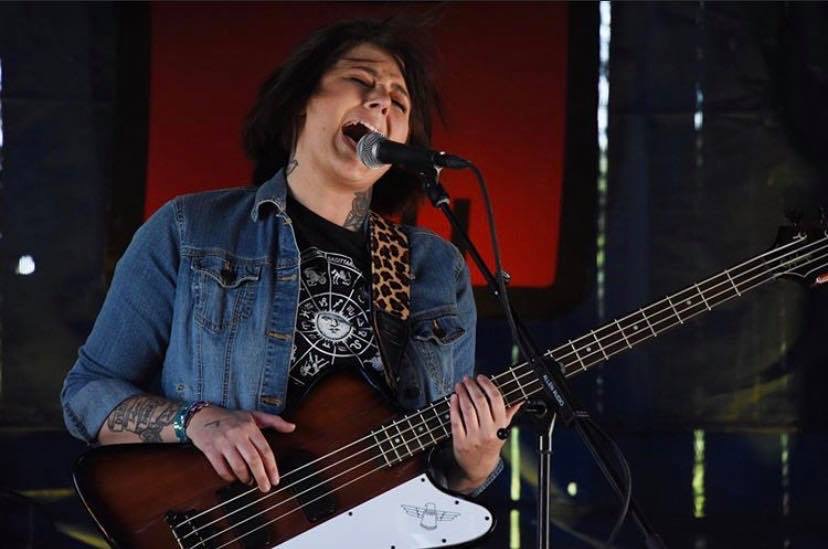
Shutdowns related to COVID-19 hurt Michigan musicians like William Love. Image: William Love
By Lucas Day
When COVID-19 closed venues across Michigan, William Love saw the three to five shows he was playing weekly disappear.
The Pistil Whips’ versatile musician’s side job as a substitute teacher at North Central Academy in Mancelona vanished as well when Michigan closed schools.
Love, 23, of Boyne City, will lose the bulk of his income. He is trying without success to qualify for unemployment. Despite the “debilitating” impacts he knows the shutdowns will have on him if they extend into the summer, he thinks it’s more important now than ever to do his job.
“I’ve just been trying to record new stuff, keep the musical presence going because everyone seems to be kinda depressed right now,” Love said. “Literally, a musician’s job is to bring people up, so I’m just trying to do anything I can.”
Previously, out-of-work musicians might drum up meal money playing in a public space with an open instrument case capturing donations from passersby. Love has been posting on Facebook videos of himself playing the flute and saxophone. He accepts donations through Venmo.
“I’ve just had a resounding amount of people tell me and reach out to me saying, ‘Hey, this video made my day, watching you play and watching you be a goofball made me smile and I really needed that right now,’” Love said.
He said he’s made around $400 so far.
Love is among the Michigan musicians who are struggling to stay afloat while in-person shows are canceled for the foreseeable future.
Holly August, a 24-year-old Petoskey resident, and her band “Daddy” just finished their first album. While the band wasn’t performing live yet, before the shutdowns August had been pulling in about half her income doing solo shows around Michigan.
The album was supposed to be released in the late spring but is likely to be delayed as more festivals and shows are pushed back, August said.
“When you write music, the most exciting thing is seeing other people hear it and like it,” August said.
The band also hasn’t had an opportunity to shoot music videos and cover art for the album as planned, August said.

Musician Holly August said her car will likely be repossessed because of the shutdown of playing venues. Image: Holly August
To stay afloat during the shutdown, August was initially taking song requests in exchange for donations through Cash App and Venmo. She performs the songs on her Facebook page and said she was receiving a few donations each day ranging from $10 to $100.
However, August decided to switch to a virtual concert approach where she sings and plays the guitar, while asking for donations. The concerts are open to anyone to view on her Facebook page.
“I’ve never really cared much about making money to begin with,” August said. “I’d much rather have a big audience and shallow pockets than vice versa.”
August said she made a couple hundred dollars taking requests, but under a hundred dollars in her first concert, which lasted around an hour. She hopes the concerts will gain more traction as she performs more.
August, who founded Wildwood Coffee in Indian River less than a year ago, had planned to move in with a friend around the time of the shutdown. However, the economic fallout of closures changed those plans and August moved in with her parents.
She said she’s grateful for the support of her family, but with the coffee shop closing and gigs being canceled, her car will likely be repossessed.
“If I hadn’t moved in with my parents, I wouldn’t be able to eat,” August said. “I feel really lucky to have my family looking out for me right now.”
August has been getting back into the music scene the last couple years after an extended absence. Losing shows is also a blow to networking efforts, she said.
“That’s what gets me even more than the money, is just missing out on making possible connections,” August said.
Like August, 30-year-old Grand Rapids musician Max Lockwood is holding public virtual concerts through Facebook and Instagram to raise money.
Lockwood performs solo and as a part of a Tom Petty tribute band called ‘The Insiders.’ He lives with bandmate, Eric O’Daly, and the two have put on shows from home together.
“Watching the comment threads as the live streams are happening, it’s just really clear that people really need it,” he said.
Lockwood, who studied classical music at DePaul, is giving one-one-one lessons music lessons to a few students on different forms of bass and guitar. He gives the lessons over platforms like Zoom, Facetime and Skype. He’s looking to bring in more students because of the loss of live shows.

Max Lockwood teaches one-on-one music lessons with a few students, but with the sudden lack of work, he’s looking for more students. Image: Max Lockwood
Lockwood estimates he’s lost 70% to75% of his income since shows were canceled.
“Gigs are where we make most of our income,” he said.
Elle Lively is doing her best to minimize COVID-19’s sting on Michigan musicians.
The Michigan Music Alliance was founded last year to provide artists with business education and networking opportunities, Lively said.
The nonprofit organization launched a relief fund on March 13 to help them survive the shutdowns. Over $20,000 has been raised so far.
Michigan musicians can apply for up to $500 in relief.
“There really is no plan B for a lot of musicians, this is what they do,” said Lively, who runs the Grand Haven-based alliance.
Still, there won’t be enough to go around.
“If you look at the number of freelance musicians in Michigan and then you consider the sound engineers and the tour managers and all of the jobs that are roped into the live music industry just in Michigan alone, it’s insane,” Lively said. “It’s a huge chunk of income for thousands of people.”
To raise awareness of the fund, Michigan Music Alliance had a four-day virtual concert with 42 artists March 26-29.
Now, they host a virtual concert with a different Michigan artist at 7 p.m. every day on Facebook to raise contributions to the alliance.
Individuals looking to help their favorite local musicians should visit their websites and buy copies of their CDs, as opposed to only using streaming services, Lively said.
“It’s weird because the music industry is really flipping back to where it used to be,” she said. “Where if you want to support somebody, you have to go buy their physical CD.”
Lively hopes musicians will qualify for unemployment as ‘self-employed’ but hasn’t heard from any who have received relief. Even if they do qualify, the process takes so long, it could be too late for many, she said.
“It’s millions of people really, all using a system that was already broken to begin with,” she said.
The support of musicians and his fan base provide a silver lining, Love said.
“It seems to be, strangely enough even though we’re all separated, really bringing people together,” he said.
With the time off to create new music, Love said The Pistil Whips will emerge stronger than ever.
“When live performances are hopefully allowed to be up and running again, we’re going to have some amazing new material,” he said.